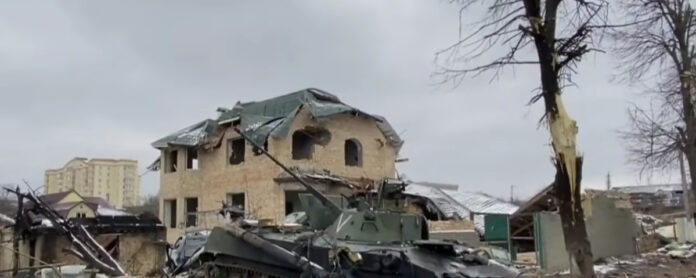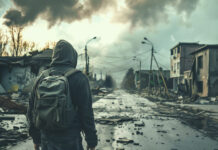Although we will probably see and hear very little about it on the mainstream media, this winter in much of Ukraine will give preppers who pay attention a preview of what happens after a collapse. While this sucks for the Ukrainians who have not relocated to parts of Europe that have more power (at least for now), we preppers can learn from it.
For example, each time Russian missiles take out power generation and distribution systems, repairing them takes longer and longer. When the power goes out, cities also run out of water. Before long, sewers will also be an issue. We’re going to get a first-hand look at what happens to families and the elderly during a winter with no heat or electric.
The Big Three
All preppers know the big three prepping priorities: Food, Water and Shelter. The lack of electricity can impact all three.
Food
Without electricity, refrigeration is impossible and storage of meat, dairy and other foods prone to spoilage becomes an issue. This affects not only home preservation but refrigerator and freezer space and stores and markets. Preparation also becomes an issue, with electric stoves and ovens becoming useless, along with small appliances items like microwaves, toaster ovens, and coffee pots.
Are you prepared to prepare your food using a camp stove, open fire, or other primitive means? If you prepare too much food and cannot safely store it, will you just eat extra, feed it to your pets, or find a hungry neighbor?
Do you have a generator? Great! Do you have enough fuel to run it all winter? Because the priority for refueling will be military vehicles, hospitals, and fire departments.
Water
As referenced above, municipal water and sewer systems require power. We’ve covered this before, but water is critical to life. If you live in a city, finding a source of clean water is going to be close to impossible. You need to have a way to filter and/or purify water. Going out to fetch water could also be dangerous.
I hope you don’t live far from the common water source, like the village well. What’s that? You say you have a wagon and can put two five-gallon containers in it? Great! I hope you are prepared to fight and kill to maintain ownership of those resources.
There may be mercy deliveries of bottled water to Ukrainian towns and villages, but don’t count on these after a broad collapse or a large-scale disaster.
Store cases of water in bottle for easy consumption, but also store five-gallon containers and fill up some 55-gallon drums. These will not save you forever, but they will help you get through a short emergency. Then usea tarp to catch rain water refill your drums and smaller containers.
Shelter
It’s hard to keep warm without power to your heater, but it is even harder when shells have blown holes in your roof and shattered the bricks in your walls. I expect many Ukrainians are going to be living in their basement, possibly with a group of neighbors or other people who have not been able to leave.
There has already been an uptick of fires in Ukraine as people burn wood to keep them warm. That’s the danger of an open fire in a house. You really need a proper fireplace, or better yet, a wood stove. Of course, fire requires firewood. We’ve already burned a full cord of wood this year, and except for a week or two, the early winter here has been warmer than usual.
Refugee Status
Millions of people left Ukraine in the early stages of the war, and millions more have left since. I hate the idea of being a refugee, but if a war has destroyed your shelter, you have no source of heat, and the water and power is off, what options do you have? Bug out or live in the wild and very few people can do that latter for any length of time.
I don’t like the idea of bugging out and prefer to bug in, but we wouldn’t have much choice if flurry of artillery shells left our house in shambles. Depending on the damage, we might be able to stay in the basement, but without a roof, that’s a questionable decision.
To me, a true refugee lives in a refugee camp and puts their future in the hands of government or NGO officials. Better to take control of your future and go live with friends or relatives in a place unaffected by the disaster, assuming such a place exists. Ukrainians can take the train to Poland. Most Americans would have to drive to get away. This is where having a sturdy, reliable vehicle comes in handy, along with cash and a few cans of spare gasoline.
Communications may be down, so you should coordinate some plans with your bug out location before the breakdown. The last thing you want to happen is for you to bug out to their place only to find they left three days before to head to yours.
Another thing to keep in mind is that if the war spreads to Poland and other parts of Europe, we’ll be getting refugees in the US., assuming the war doesn’t reach our shores.







